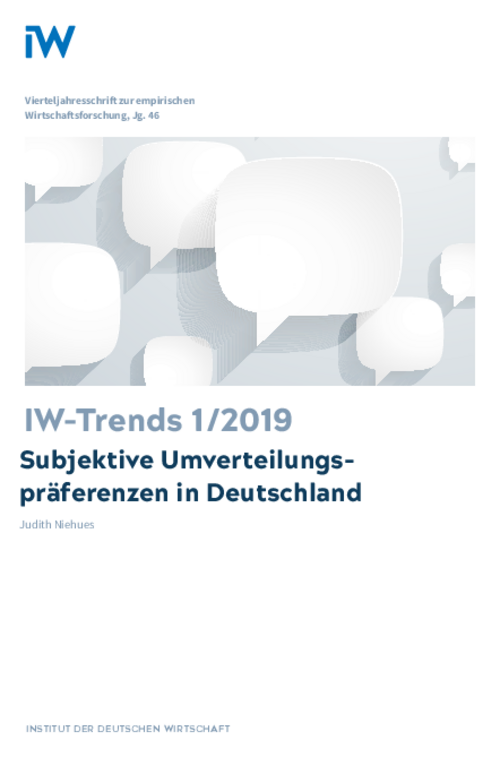Survey data suggest that a majority of Germans want the government to reduce income disparities. This subjective preference for redistribution has increased markedly in the past decade, regardless of the actual development of distribution ratios, which have hardly changed since 2005.

Subjective Redistribution Preferences in Germany: Popular Will and Political Reality
IW-Trends

Survey data suggest that a majority of Germans want the government to reduce income disparities. This subjective preference for redistribution has increased markedly in the past decade, regardless of the actual development of distribution ratios, which have hardly changed since 2005.
Germany is by no means the only country in which the majority of citizens hold the state responsible for reducing the income gap between rich and poor. Yet in Germany this desire for equality is above the rich-country average, even though few OECD countries actually achieve a greater level of redistribution through government levies and transfers. A detailed examination of redistribution preferences reveals little interest in expanding expenditure expressly designed to benefit less privileged groups. Where taxes are concerned, the broad population favours a greater degree of progression. However, furthr survey results suggest that the redistributive effect already achieved by the income tax system is considerably underestimated. At the same time, polls indicate a marked preference for recognisable income differences as long as they are seen to be justified by performance. It would therefore make sense, while not ignoring conventional inequality indicators, to focus more closely on measures of equality of opportunity and rewards for performance, as this would make clearer whether the policies implemented really address the perceived deficits in fairness that interest voters.

Judith Niehues: Subjektive Umverteilungspräferenzen in Deutschland – Wunsch und Wirklichkeit
IW-Trends

More on the topic

The Political Economy of Pension Reform
As the German population ages, the country’s statutory pension scheme, which is financed on a pay-as-you-go basis, requires higher and higher contributions while the level of pensions is falling.
IW
Challenges for the debt brake
In 2019, Bardt et al. (2019) initially presented a comprehensive estimate of the unmet public investment needs in Germany not covered in household planning at the time, totaling around €460 billion over ten years.
IW